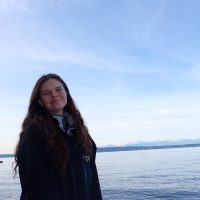Next stop, Croatia. A study abroad to research the Adriatic’s marine mammals and sea turtles
About to embark on a study abroad adventure is Ellie Thomas, a Marine Biology undergraduate heading into her third year of study at the University of Washington. On 1 September, Ellie will be flying (and driving and boating) more than 5,000 miles away to Veli Lošinj, a small town on one of the western islands of Croatia, nestled in the Adriatic Sea. “I have never been to Croatia before, so I’m excited to explore and integrate into a new culture,” Ellie said.

Ellie will be in Croatia for the whole of Autumn, joining a program run by the School for Field Studies (SFS) which focuses on cetacean ecology and sea turtle restoration, called SFS Croatia. Separating the Italian peninsula from the Balkan peninsula, the Adriatic Sea is filled with marine mammals and turtles, such as dolphins and loggerhead turtles, but its waters rank among Europe’s most heavily trafficked and fished. “We are given the opportunity to explore our own research questions and work with our peers to learn more about the ecology of the Adriatic Sea. We will go out on a boat weekly to observe and identify cetaceans and are partnered with a local rehabilitation center that focuses on sea turtle conservation,” Ellie shared.
The program doesn’t only host students from UW but instead brings together students from all over the US. For Ellie, she’s excited to learn new skills and build on what she’s learned during her time at Marine Biology UW so far. “While at UW I have gained experience with lab work through the Polar Science Center on a phytoplankton-based project. I am excited to explore the ecology and conservation side of Marine Biology to give insight into what I am most passionate about, while also contributing the knowledge I have gained at UW to SFS,” Ellie said.
Students survey bottlenose dolphins, satellite track turtles, and monitor seagrass, while analyzing how shipping, tourism, and bycatch threaten fragile populations. They log data for conservation records while tackling big questions such as how science and society must work together to ensure the long-term health of the Adriatic and its occupants.
Study abroad programs don’t just extend the horizons of learning for students—they extend their horizons in multiple ways, by immersing individuals in new cultures and opening up connections with other people and places. “I hope that this program provides hands-on experience and guidance while learning how to do research, but in addition, I’m super excited to meet new people and explore a unique country,” Ellie said.
So, what inspired a study abroad for Ellie? The answer is close to home! “I found out about the program through my mom who did field work in Australia with SFS when she was in college,” Ellie shared. “After hearing about her experiences, I searched through the different opportunities offered by SFS, and loved the hands-on experience offered by their Croatia program.”
Though traveling to a new country and working on a new science project, studying abroad is not a completely new experience for Ellie. “I have also participated in a UW faculty-led study abroad in Costa Rica, which focused on rainforest microbiomes both in tropical and temperate environments. This study abroad gave me incredible experience in science and showed me how fun and exciting research can be,” she said. “I used the knowledge of my mom’s study abroad experience and my previous trip to choose the SFS Croatia program as my next adventure.”